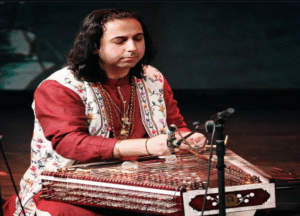
Harmonizing Dreams: An Interview with Dr. Jaya Tiwari, Founder of India’s First All-Female Mission Rock Band ‘Meri Zindagi’
The morning sun filters through the windows of a modest home in Lucknow, where the rhythmic whistle of a pressure cooker blends with guitar chords. This is where Dr. Jaya Tiwari, founder of India’s pioneering all-female mission rock band ‘Meri Zindagi,’ transforms the ordinary symphony of domestic life into extraordinary musical activism.
Interviewer: Dr. Tiwari, your band has performed over 550 concerts across India. But let’s start at the beginning—what inspired you to create India’s first all-female mission rock band?
Dr. Jaya Tiwari: You know, the inspiration came from a deeply personal place. In Uttar Pradesh, one out of five girls is subjected to child marriage. Their dreams and ambitions decay and die after this. I have a PhD in music and spent over five years as a radio jockey, but I realized that academic knowledge and media presence weren’t enough. These critical social issues needed to come out of intellectual circles and big conference halls into the open, amid common people. Music became our vehicle for change.
Interviewer: The name ‘Meri Zindagi’ is profoundly personal. How does it reflect your band’s philosophy?
Dr. Jaya Tiwari: [laughs] It’s beautifully simple, isn’t it? ‘Meri Zindagi’ means ‘My Life,’ and that’s exactly what we represent—the authentic lives of women. We are a bunch of simple, middle-class women who juggle their ordinary lives with the extraordinary. We wake up early, finish our jamming session by 7:30 am, and move on with our jobs, housework, or college. We sing, play, and do household chores all at the same time, and we love our lives!
Interviewer: Your band uniquely uses kitchen equipment as musical instruments. Can you elaborate on this innovative approach?
Dr. Jaya Tiwari: This stems from our core philosophy of finding beauty in the ordinary. We use chimta, belan, thali, and oakhli as musical equipment without the frills of conventional instruments. The pressure cooker’s whistle becomes a wake-up call to dreams, an alarm to get ready and face the world head-on. As we sing in one of our songs: ‘Dreaming ke pressure cooker ki seeti ko bajney do… Kajal chudi bindi jhumke payal se sajney doo.. Mere hausalon ke shankh naad bajney do bajney do bajney do…’
Interviewer: Your band has created over 70 songs addressing critical social issues. Which campaigns have been most impactful?
Dr. Jaya Tiwari: Several campaigns have resonated deeply with our audiences. Our ‘No Sutta’ campaign was part of a Pan-India anti-smoking drive, raising awareness about smoking’s harmful effects. We’ve also run #humkaalehain addressing color prejudice, and #maaki against derogatory female-centric slangs. But perhaps most importantly, we’ve focused on female infanticide, child marriage, girl-child education, domestic violence, and sexual harassment—issues that desperately need musical interpretation and public discourse.
Interviewer: You’ve performed for diverse audiences across rural and urban areas. How do different communities respond to your message?
Dr. Jaya Tiwari: It’s incredibly heartening! Despite our major focus on female-centric issues, the band isn’t limited by gender—we have a substantial male fanbase too. The issues we raise affect not just women, but men as well. In many of our performances, audiences begin to sing with us, making it a more interactive experience of awareness and entertainment. At the end of the day, gender equality isn’t about shifting oppression from one group to another—it’s about eliminating it entirely.
Interviewer: Your band has created jingles for All India Radio, UP Mahila Police, and Women Power Line 1090. How important is institutional collaboration?
Dr. Jaya Tiwari: Absolutely crucial! When we work with institutions like the UP Mahila Police or the Women Power Line 1090, we’re not just creating music—we’re building bridges between grassroots activism and institutional support. These collaborations amplify our message and provide official backing to the social causes we champion.
Interviewer: Beyond entertainment, Meri Zindagi is described as a mission band. What’s your ultimate mission?
Dr. Jaya Tiwari: Our mission is beautifully summarized in one phrase: “Save the Girl Child.” We perform to create awareness and sensitize people about issues that women encounter and to empower girls to follow their dreams. We’re not just focused on providing entertainment—we’re born for causes like domestic violence, female foeticide, and women’s education. Every song we create, every performance we give, is an instrument of change.
Interviewer: What challenges have you faced as an all-female band in India’s male-dominated music industry?
Dr. Jaya Tiwari: The challenges are real, but they’ve also been our greatest teachers. In a country where the music industry is mostly male-dominated, we’ve had to prove ourselves repeatedly. But we’ve stood indomitable in the face of these challenges. Each obstacle has made us stronger and more determined to break stereotypical ideas about men dominating music bands.
Interviewer: How has your academic background in music influenced your approach to social activism?
Dr. Jaya Tiwari: My PhD in music provided me with technical expertise, but my experience as a radio jockey for over five years taught me about reaching diverse audiences. However, I realized that academic knowledge alone wasn’t sufficient. The real impact comes from combining musical sophistication with grassroots understanding. Our songs aren’t just melodious—they carry powerful messages that resonate with people’s lived experiences.
Interviewer: Your band has educated multiple girls and performed over 100 shows. What’s next for Meri Zindagi?
Dr. Jaya Tiwari: We’re expanding our reach while staying true to our roots. We want to continue performing across India, especially in rural areas where these messages are most needed. We’re also working on new songs that address emerging social issues while maintaining our unique style of incorporating everyday household items into our music.
Interviewer: What advice would you give to young women who want to use their talents for social change?
Dr. Jaya Tiwari: Find beauty in the ordinary and transform it into something extraordinary. Don’t wait for perfect conditions or expensive equipment. We started with kitchen utensils and dreams—that’s enough. Most importantly, remember that your voice matters. Whether you’re singing about pressure cookers or social pressure, your authentic experience can inspire change.
Interviewer: Finally, how do you envision the future of women in Indian music and activism?
Dr. Jaya Tiwari: I see a future where women don’t just participate in music and activism—they lead it. Where every girl child knows she has the right to dream, to sing, to speak up. Where the whistle of a pressure cooker reminds us not just of daily routines, but of the urgency to pursue our aspirations. That’s the India we’re singing for, one song at a time.
As our conversation concludes, the sounds of daily life continue around us—the ordinary symphony that Dr. Jaya Tiwari and her band have transformed into a powerful anthem for social change. Through ‘Meri Zindagi,’ they’ve proven that revolution doesn’t always require grand gestures; sometimes, it begins with the courage to find your voice in the everyday cacophony of life.


